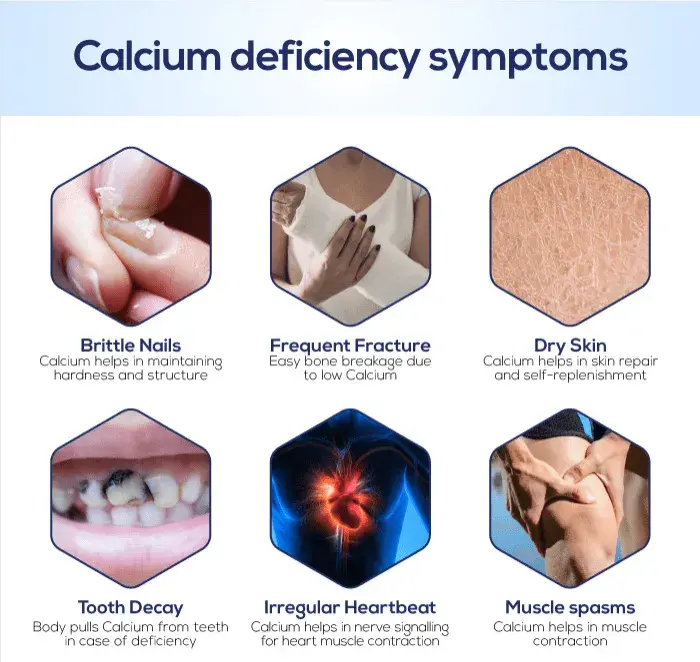Calcium is an important mineral for building strong bones and teeth and for hormone secretion in the human body. Calcium is also required to properly function the heart, nerve signaling, and other body muscles. People who do not get enough Calcium deficiency symptoms in their blood as kids do not develop as adults and grow to their full potential height. The recommended amount of calcium per day can be obtained from calcium-rich food, vitamins or minerals, and calcium supplements.
Calcium deficiency is also known as Hypocalcemia. Hypocalcemia symptoms may include dental and gum problems, fragile bones, blood clots, cognitive changes, etc. Calcium deficiency symptoms are common in adults that may result in various health issues. Anyone who experiences calcium deficiency has the risk of osteoporosis, osteopenia, and Hypocalcemia.

What can cause calcium deficiency?
Many factors put your health at risk, but the chances of calcium deficiency increase with age. Here are some of the causes of calcium deficiency that we mentioned. It includes -- Not enough intake of calcium for a long time, especially during childhood
- Some drugs or medications influence can decrease the absorption of calcium in the body
- Dietary intolerance to calcium-rich foods
- Hormonal changes in women
- Certain genetic factors
- After menopause, women often suffer because of bone density decline and bone thinning- which become faster after menopause. It happens largely because of the decline in estrogen hormones. Thus, you must take good care of your body and reduce the risk of osteoporosis and calcium deficiency.
- Another condition that may arise due to calcium deficiency is Hypoparathyroidism, a condition where a person cannot produce enough amounts of parathyroid hormone, helping to control the level of calcium in the body.
- Another major cause of calcium deficiency is malnutrition & malabsorption. Malnutrition happens when you are not getting enough nutrients in your body. Malabsorption may develop when your body cannot absorb enough vitamins and minerals to make you healthy and have enough body shape with an appropriate body mass index (BMI).
What are the Common Calcium deficiency symptoms?
Hypocalcemia or calcium deficiency can be fatal if left untreated. You can get proper medical assistance for calcium deficiency by noticing the following symptoms -
#1 Muscles problem
A patient with calcium deficiency may experience muscle aches, cramps, and spasms. In some cases, most patients can also suffer from- Pain in the thighs while walking and
- Pain in the arms while moving.
#2 A feeling of fatigue and dizziness
A calcium deficiency can cause severe feelings of fatigue and dizziness in patients. Low levels of calcium in the body involve a lack of energy and an overall feeling of sluggishness. It can also lead to insomnia.#3 Numbness and tingling sensations
Calcium deficiency in a patient may result in tingling sensations in the hands, arms, feet, and legs that do not disappear with activity. You may also feel numbness and sensation around the mouth area.#4 Nail and skin problems
A long-time calcium deficiency in a patient may cause nail and skin problems. Some of the symptoms:- Dry skin
- Dry, broken, or brittle nails
- Coarse hair
- Alopecia (a condition causing hair to fall in patches)
- Eczema (a condition that occurs because of skin inflammation and itchiness in patches)
- Psoriasis (a kind of skin disorder causing rash, itchiness, and scaly patches)
#5 Dental problems
This is one of the major Calcium deficiency symptoms that occurs in infants and can impair tooth development. When the body lacks calcium level, it pulls it from sources such as the teeth and bones. Lacks calcium level can lead to dental problems, including- Tooth decay
- Brittle teeth
- Bad breath
- Irritated gums and gum diseases
- Weak tooth roots and root infection
#6 Severe Premenstrual syndrome (PMS)
A calcium deficiency in women has been linked to severe premenstrual syndrome (PMS). Having inadequate calcium levels in women leads to mood disorders, sleep problems, and unexpected food cravings. It is recommended that women must take 1500 - 1200 mg of calcium per day. According to medical researchers, it is concluded that low levels of vitamin D and calcium in women during the second or third day of the menstrual cycle might contribute to symptoms of PMS. Some supplements may help relieve the symptoms of a calcium deficiency in men and women, such as - Himalayan Organics Calcium, Magnesium Zinc, Vitamin D3 & B12 - 120 Tablets.#7 Depression
Inadequate calcium levels in the body have been linked to mental health problems such as the feeling of sadness and mood disorders. According to medical evidence and researchers, calcium deficiency may contribute to Major depressive disorder (MDD). In some cases, patients lose pleasure in life. Also, Read Which vitamin deficiency causes hair loss?Conclusion -
Hydration is the key to any medical condition - even if it is about Calcium deficiency symptoms. Hypocalcemia symptoms can be the same as symptoms of calcium deficiency. You can bring a little change to your lifestyle by managing your body weight. Promote healthy body weight by exercising regularly for at least 30 minutes and restricting tobacco & alcohol intake. If you're having trouble getting enough calcium or calcium deficiency, you must consult an expert dentist to get optimum care.
Reviewed by







